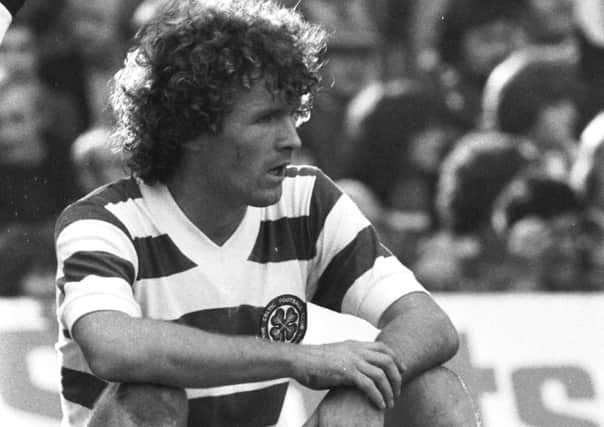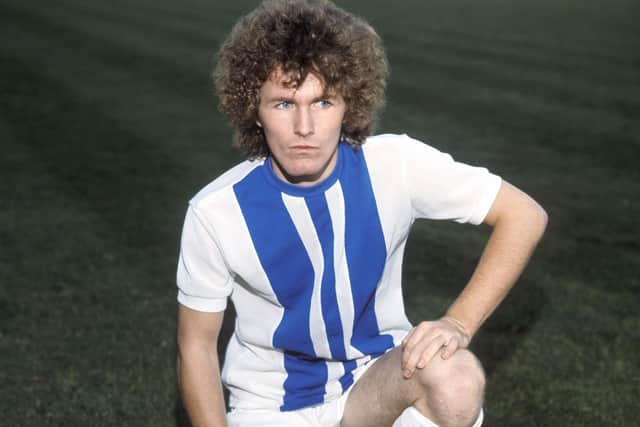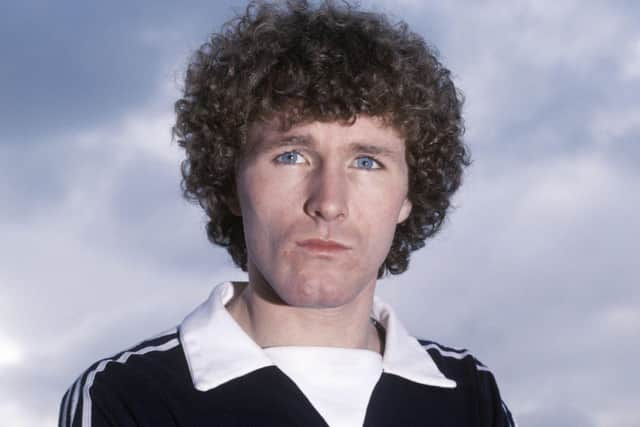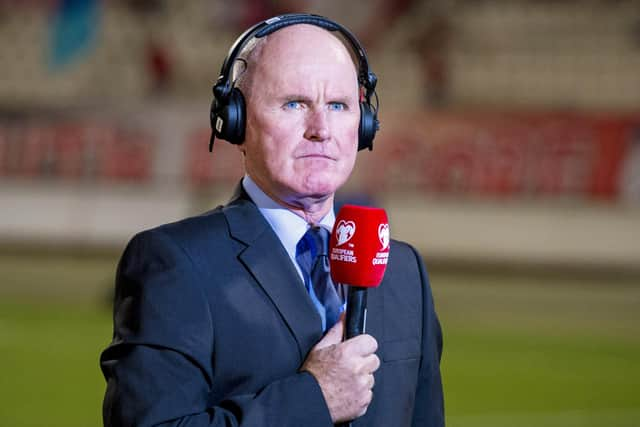Celtic great Davie Provan on struggling to cope when ME ended his career at 29


Some good things have come out of Covid. Bluer skies, clearer waters, families round the dinner table, a deeper appreciation of the NHS and also schoolteachers. Doubtless you’ll be able to think of others and today Davie Provan nominates one that’s close to his heart.
“There’s a whole lot more awareness of post-viral fatigue now so maybe that’s been a by-product of the pandemic,” says the Celtic wing legend. More awareness and more money. “I believe the Government has already promised £8 million for research. This is not a fatal illness and therefore it has suffered in the past through under-funding. But we’re now seeing so many people, after they initially recover from coronavirus, being hit by post-viral fatigue and understanding and help is badly needed.”
Advertisement
Hide AdAdvertisement
Hide AdProvan, you will remember, was struck down in his prime by ME. One minute he was flying down the right flank, socks round his ankles in trademark style, the next he was sleeping for 16 hours at a time – knackered, spent, gone. With all respect to Stuart Murdoch, leader of indie rockers Belle and Sebastian, and the novelist Ali Smith, he remains Scotland’s best-known victim of the condition, playing his part in raising awareness. “I’ve seen so many horrible cases of young people left housebound, even bedbound – lives ruined,” he says.


Myalgic encephalomyelitis is sometimes called Chronic Fatigue Syndrome and, less helpfully, it was nicknamed “yuppie flu” when Provan was diagnosed during the 1985-86 season. Now 64 and Scotland’s preeminent TV match analyst, he feels for those recovering from Covid having their extreme tiredness compared with ME symptoms, and winces at recent claims that sufferers have been given conflicting and potentially harmful advice.
One set of health experts recommend a regime of physical activity to regain strength but another set warn against this. Provan and his Celtic manager David Hay were convinced his malady would pass so decided he would continue to train and play for the reserves. “It was the worst thing I could have done,” he admits.
The current confusion over how best to treat the after-effects of Covid make Provan think that little has really been learned about conditions like his, which, perhaps understandably, baffled the medical profession 35 years ago because ME seemed to come from nowhere.
“There was no science around it at that time. I remember the Celtic doctor – Fitzie, John Fitzsimons, God bless him – suggesting I knock back a couple of strong coffees in the hope that would gee me up. Eventually I was referred to Professor Dermot Kennedy at the old Ruchill Hospital who sat me down, asked for my symptoms and very quickly said: ‘You have myalgic encephalomyelitis’. I’d never heard of it but it was long and didn’t sound good. ‘Will I play again?’ I asked. He said: ‘Most unlikely’.”


Provan continues to live under the shadow of ME. “Running or anything cardiovascular is beyond me. Any kind of physical work, even gardening, and I will have a relapse. I am able to walk round a golf course now where for a long time I had to use a buggy. But I’ll have ME all my days.”
At least it hasn’t stopped him being an erudite co-commentator for Sky Sports and a punchy columnist for the Sun. He brings to both insight from a career, albeit curtailed at 29, when he was obviously paying attention. He may have fitted the bill of the classic Scottish archetype with his avowed touchline-hugging but he wasn’t that cliche, the eccentric or daft winger.
We’ll return to the shock end to the career but let’s start with the dramatic beginning. It was dramatic because, playing for Kilmarnock in a Scottish Cup fourth-round replay at Rugby Park in 1978, he terrorised the Celtic defence to such an extent that he was probably bound to end up at Parkhead to avoid him ever doing it again.
Advertisement
Hide AdAdvertisement
Hide AdIt was dramatic because Glasgow’s East End was maybe an unlikely destination, given that the Gourock boy’s family were staunch Rangers fans. Provan’s train-driver father, also Davie, took him and his brother to Ibrox where he studied the wing play of Willie Henderson. “Our street was maybe half and half but when the boys all played football together, every minute we could, there was none of the bitterness that comes from sectarianism which spoils the Old Firm rivalry now.” Provan was a winger right from those kickabouts.


“I was tapped by Celtic and it was [Jock Stein’s assistant] John Clark who phoned me: ‘Look, we know you don’t have a Celtic background but we wondered if you’d still come to us’. I didn’t hesitate. And from that moment on Dad and the rest of the family became Celtic fans. Rangers went right out of the window; they were the enemy.”
Staunch Rangers, as was, and staunch Labour, as was, for Provan would go on to break with that tradition, make up his own mind, and as he once put it, “voted for Maggie Thatcher three times”.
Today he says he doesn’t want to be drawn on politics only to explain his reasoning: “At that time higher earners were having to pay tax of 86p in the pound and the country was a basket case. When I was part-time at Killie I worked at a distillery in Paisley and saw first hand how wildcat strikes were wrecking companies. But I certainly wouldn’t vote Tory now. Not for the comedians we’ve got in Downing Street at the moment.”
Modest fellow that he is, Provan says that eye-catching performance would probably have turned out differently if Celtic, short of left-backs, had stuck the fearsome Roy Aitken there rather than John Dowie. Nevertheless that was his best game for Killie and six months later he became a £125,000 record Scottish transfer. “What some of today’s players earn in a week,” he laughs.
When we discuss hairstyles and his distinctive bubble-perm he says he thinks he sported the style before Alan Rough, Asa Hartford and Derek Johnstone went curly for the Argentina World Cup but, modest again, he wouldn’t describe himself as a trichological trailblazer. Staying with personal style I’m wondering about the authenticity of a remark from George McCluskey: “Davie always had tight jeans and loved wearing these four-inch heels.” “Absolutely true,” he says. “I was always wee so needed all the help I could get. Believe it or not I did take a stretch once, but still only reached 5ft 8ins.”
Provan wasn’t as pocket-sized as Jimmy Johnstone but nor did he possess the intimidating bulk of John Hughes. He’d been understandably apprehensive about following these two and subjecting himself to the critical rigour of the Jungle but was reassured by McNeill: “Forget about the money we’ve paid for you. I want you on the touchline always with white paint on your studs. Skin the full-backs, put over your crosses and these people will love you.” He has a lot to thank Cesar for, not least in persuading the Parkhead board to grant him a testimonial when ME brought him to a juddering halt. “Billy wasn’t a tactics-board manager, it was all inspirational stuff. He was at his best before big games, knowing exactly the right thing to say to us.”
I make the mistake, which Provan says many have done, of remembering him as speedy. A trick of the (flood-)light, perhaps, or an impression enhanced by the shirt fluttering flamboyantly outside the shorts and his rolled-down hosiery. “I wasn’t blessed with great pace and had to be a shift-and-hit wide player, rather like John Robertson. My backside would be against the touchline and I’d try to get the full-back square on to me. That would buy me the half-yard I needed to get in a cross.” By the way, the thing with the socks wasn’t an affectation. Because of his sturdy calves he always found them too tight.
Advertisement
Hide AdAdvertisement
Hide AdHis first season in the hoops would have a stunning conclusion when Ten Men Won the League. This was the heavily-immortalised 4-2 title-clinching victory over Rangers, Celtic having to play almost the entire second half without the sent-off Johnny Doyle. “Our dressing room was bedlam afterwards. Winning the European Cup couldn’t have topped the emotion of the night. And the chairman, Desmond White, when he’d quietened everyone down, said: ‘Gentlemen, this is our club’s finest achievement since Lisbon’.”
Six months later, against Belgium in the Heysel, Provan made his Scotland debut, though the previous evening hadn’t been at all sure this would happen. “We were training on an adjacent pitch, terrible surface, I shanked a cross over the crossbar and [manager] Jock Stein gave me an almighty bollocking.
“I was on the bench for the game and just so desperate to be out there with Joe Jordan. I’d been behind the goal at Hampden when his wonderful diving header against Czechoslovakia had sent us to the [1974] World Cup and back then the idea of me one day being in the same Scotland team was a bit of a fantasy.
“Unfortunately Joe was the guy I replaced against Belgium but it was still a great thrill. At the end one of their guys got quite angry when I wouldn’t swap shirts. For all I knew that was going to be my one and only appearance so there was no way I was giving mine up.”
Provan would collect nine more caps. He passed to Steve Archibald who then won the penalty, converted by fellow shift-and-hit merchant Robertson for the 1981 Wembley victory over England. “My only contribution of note as I had a stinker that day. That was the game where [Football Association secretary] Ted Croker tried to ban the Tartan Army only somehow, some way, a large number of them managed to get hold of tickets and they were a lovely, comforting sight when we emerged from the tunnel.”
He reckons his best game in dark blue was another World Cup qualifier, Scotland sent on their way to Spain by another towering Jordan header, this time against Sweden. “I was flying then,” he says. And in the same campaign, against Israel, he scored his only Scotland goal. “Graeme Souness slid me a square pass and was then clattered. The weight was perfect, as you’d expect, so I could allow the ball across my body and hit it first-time.” Next Friday Israel are back at Hampden in the Nations League and Provan will be on TV duty, eager to see Lyndon Dykes enjoy “the fabulous feeling and every lad’s dream” of scoring for his country for the first time.
Provan claimed four titles, two Scottish Cups and one League Cup with Celtic. His team, all of the aforementioned plus Charlie Nicholas, Murdo MacLeod and of course Danny McGrain, may not have been the greatest in the club’s history but their spirit was imperishable – in that first championship season he remembers a handful of other games won despite red cards. Arsenal wanted to sign him but John Clark cautioned: “If you leave the supporters will burn the stand down.” He had no desire to go; he was loving his football.
Best goal? “Against St Johnstone at Celtic Park in the League Cup. Charlie switched the ball to me, it arrived waist-height, 25 yards out, and I probably should have brought it down but I just smashed this volley, which started off outside the post, into the top left-hand corner of the net.
Advertisement
Hide AdAdvertisement
Hide Ad“But my most important goal was the free-kick in the 1985 Scottish Cup final against Dundee United. Same distance, similar swerve. I could have stood there for a whole year and not stuck that one any better.”
Provan, though, wouldn’t get that year. Six months later during an Old Firm game at Ibrox he couldn’t see properly and felt like he was wearing diving boots. “Initially there was a lot of scepticism about ME and the medical profession didn’t help,” he says. “It was first associated with hedge-fund managers, the guys who ran the City of London getting burned out from making all that money, and the yuppie flu label trivialised it.”
There was suspicion too. Were sufferers not just work-shy? “No one could have thought that about me: I had the best job in the world.” Nevertheless, Scottish football was a macho culture. “Even my own family were thinking: ‘What’s wrong with him?’
“The black irony was that I looked perfectly well so it was difficult for people to understand what I was going through.” And it was a lot. “I knew I was seriously ill. Fortunately my girlfriend Fiona, now my wife, was very understanding because the bouts of depression would last for weeks and there were times when I wondered if the darkness was ever going to lift. That’s not a good place to be, particularly when you’ve just lost your career.”
Provan, a dad-of-two, investigated every possible solution. “Faith healers, special diets, hypnotists and a fair few quacks. Nothing worked.” His profile brought bundles of letters from people with the same symptoms. “I answered every one but the most frustrating thing, when folk asked ‘How did it pass?’, was having to tell them it didn’t. I wasn’t cured and I never will be.”
When he eventually came through the worst Provan became a figurehead for the ME Association. “I remember writing to a doctor who’d claimed that ME was a by-product of depression. I told him he’s got that the wrong way round – ME is not a psychological illness. It still makes me angry when I hear it described as that. But I’ve got to be honest and say that there came a point when I had to cut the cord and stop that work. This may sound selfish but I was hearing so many dreadful stories about people who were seriously ill that it wasn’t doing me any good.”
We return to the subject of the Old Firm with the hope I can get a title prediction out of him. He didn’t like playing in the fixture. “It was always too intense. These games were only enjoyable if you were two-nil up and the ref was looking at his watch. The fear of losing was just horrendous.” He says humour was non-existent in the heat of battle although a famous jibe is attributed to him, with a bamboozled Alex MacDonald the target: “I could keep a beach ball away from you in a phone-box.” Oh, and Davie Provan (Celtic) is no relation to the late Davie Provan (Rangers) but our man adds: “I used to get his mail. Equal amounts abusive and complimentary and I think he got some of mine. We had a good laugh about that on the golf course.”
He cannot be ambivalent about this season in the long and rowdy history of the Old Firm and isn’t. “I think Celtic will win the league. There’s a resilience to them and I think Neil Lennon can trust his players. I’m not sure if Steven Gerrard can really trust his. Most weeks he seems to have his fingers crossed.”
Advertisement
Hide AdAdvertisement
Hide AdStrikers win titles, he asserts, and while Alfredo Morelos is a “very good” one he no longer appears “committed”. But across the great divide speculation about Odsonne Edouard’s future won’t die down. “If he’s sold maybe the stand would be at risk again – and that’s a joke, by the way. But I reckon Peter Lawwell would have to think seriously about leaving the country.”
A message from the Editor:
Thank you for reading this story on our website. While I have your attention, I also have an important request to make of you.
With the coronavirus lockdown having a major impact on many of our advertisers - and consequently the revenue we receive - we are more reliant than ever on you taking out a digital subscription.
Subscribe to scotsman.com and enjoy unlimited access to Scottish news and information online and on our app. With a digital subscription, you can read more than 5 articles, see fewer ads, enjoy faster load times, and get access to exclusive newsletters and content. Visit https://www.scotsman.com/subscriptions now to sign up.
Our journalism costs money and we rely on advertising, print and digital revenues to help to support them. By supporting us, we are able to support you in providing trusted, fact-checked content for this website.
Joy Yates
Editorial Director
Comments
Want to join the conversation? Please or to comment on this article.
